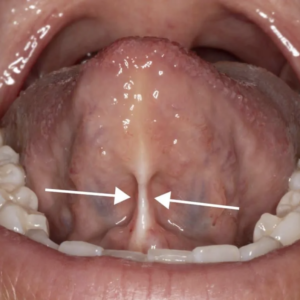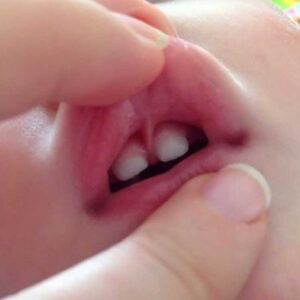Every year, thousands of children are diagnosed with tongue-ties or lip-ties that make nursing, eating, and speaking difficult. In the U.S., treatment is easy and readily available in the form of a simple procedure called a frenectomy.
Lip/Tongue Ties
Our Location
410 Rosedale Court, Suite 170,
Warrenton, VA 20186
540-717-9819
What’s a Tongue-Tie?
Most people don’t really notice these tiny bands of flesh called Frenelums (also referred as lingual frenum for lower) because they’re so small. Like most things in the body, they have an important purpose that when disrupted, can have serious consequences. Kids who are tongue-tied have an underdeveloped lingual frenum. This occurs because that piece of flesh never thinned out when the baby was in the womb.
Someone who has tongue-tie might have difficulty sticking out his or her tongue. Tongue-tie can also affect the way a child eats, speaks and swallows.
Sometimes tongue-tie may not cause problems. Some cases may require a simple surgical procedure for correction.
What’s a Lip-Tie?
The piece of tissue behind your upper lip is called the frenulum (also referred as labial frenum for upper). When these membranes are too thick or too stiff, they can keep the upper lip from moving freely. This condition is called a lip tie.
A severe lip-tie can restrict baby teeth from coming in properly, causing misalignment issues for years to come.
You can easily check for a lip-tie by attempting to gently pull your baby’s upper lip away from the gums. If the labial frenum is extended far down into the gum line and it is awkward/difficult to pull the lip from the gums, your child most likely has a lip-tie.
Tongue-Tie / Lip-Tie Symptoms in Infants
- Difficulty latching on or falls off the breath easily
- Gumming or chewing the nipple while nursing
- Unable to hold a paci or bottle
- Gassy (swallowing a lot of air during nursing)
- Poor weight gain
- Excessive drooling
- Baby is not able to fully drain breast
- Choking on milk or gasping for air while nursing
- Falling asleep during feedings
- Sleep deprivation (frequent night feedings)
- Extended nursing episodes
- Clicking noises while sucking
- Popping on and off breast often
- Biting the nipple
- Gap between teeth/ jaw issues
We recommend bringing infants who may have a lip-tie or tongue-tie into our office for a full exam. Lip-ties can inhibit babies from nursing properly and can cause more serious problems down the line.
Contact Dr. Bonnie Foster for more information on tongue-tie or lip-tie and what treatment options are available.


